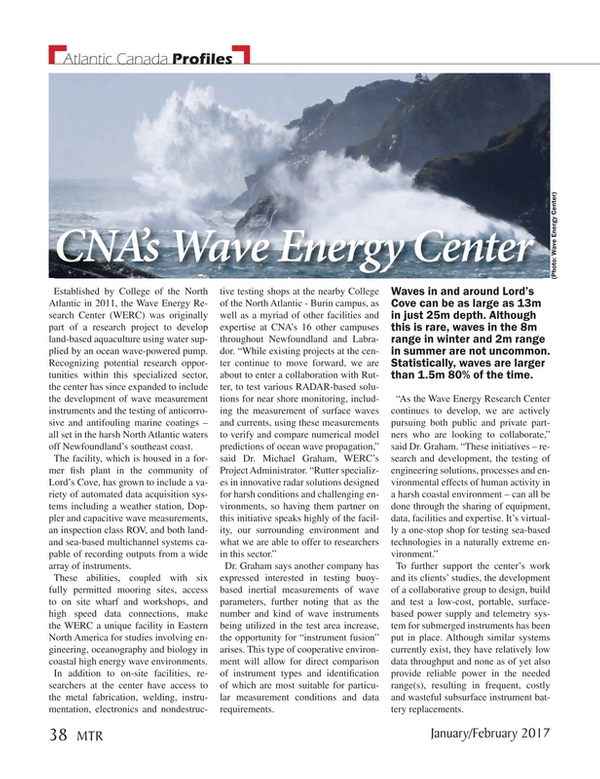Established by College of the North Atlantic in 2011, the Wave Energy Research Center (WERC) was originally part of a research project to develop land-based aquaculture using water supplied by an ocean wave-powered pump. Recognizing potential research opportunities within this specialized sector, the center has since expanded to include the development of wave measurement instruments and the testing of anticorrosive and antifouling marine coatings – all set in the harsh North Atlantic waters off Newfoundland’s southeast coast.
The facility, which is housed in a former fish plant in the community of Lord’s Cove, has grown to include a variety of automated data acquisition systems including a weather station, Doppler and capacitive wave measurements, an inspection class ROV, and both land- and sea-based multichannel systems capable of recording outputs from a wide array of instruments.
These abilities, coupled with six fully permitted mooring sites, access to on site wharf and workshops, and high speed data connections, make the WERC a unique facility in Eastern North America for studies involving engineering, oceanography and biology in coastal high energy wave environments.
In addition to on-site facilities, researchers at the center have access to the metal fabrication, welding, instrumentation, electronics and nondestructive testing shops at the nearby College of the North Atlantic - Burin campus, as well as a myriad of other facilities and expertise at CNA’s 16 other campuses throughout Newfoundland and Labrador. “While existing projects at the center continue to move forward, we are about to enter a collaboration with Rutter, to test various RADAR-based solutions for near shore monitoring, including the measurement of surface waves and currents, using these measurements to verify and compare numerical model predictions of ocean wave propagation,” said Dr. Michael Graham, WERC’s Project Administrator. “Rutter specializes in innovative radar solutions designed for harsh conditions and challenging environments, so having them partner on this initiative speaks highly of the facility, our surrounding environment and what we are able to offer to researchers in this sector.”
Dr. Graham says another company has expressed interested in testing buoy-based inertial measurements of wave parameters, further noting that as the number and kind of wave instruments being utilized in the test area increase, the opportunity for “instrument fusion” arises. This type of cooperative environment will allow for direct comparison of instrument types and identification of which are most suitable for particular measurement conditions and data requirements.
“As the Wave Energy Research Center continues to develop, we are actively pursuing both public and private partners who are looking to collaborate,” said Dr. Graham. “These initiatives – research and development, the testing of engineering solutions, processes and environmental effects of human activity in a harsh coastal environment – can all be done through the sharing of equipment, data, facilities and expertise. It’s virtually a one-stop shop for testing sea-based technologies in a naturally extreme environment.”
To further support the center’s work and its clients’ studies, the development of a collaborative group to design, build and test a low-cost, portable, surface-based power supply and telemetry system for submerged instruments has been put in place. Although similar systems currently exist, they have relatively low data throughput and none as of yet also provide reliable power in the needed range(s), resulting in frequent, costly and wasteful subsurface instrument battery replacements.



